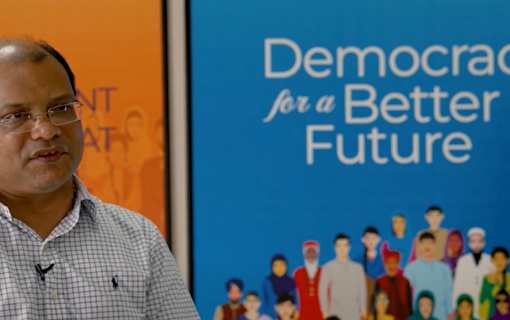IFES Election Report: Malawi An Overview of the 1999 Presidential and Parliamentary Elections, July 30, 1999
EXECUTIVE SUMMARY
This report has been prepared as an account of the 1999 presidential and National Assembly Elections in Malawi. The International Foundation for Election Systems (IFES) has worked in Malawi since 1993 in support of peaceful, democratic and well-conducted electoral events. During the referendum and first multiparty elections in Malawi, IFES provided technical advice in the areas of voter registration, election worker training, and voter education. Funding for this project has been made available by the US Agency for International Development.
In late 1996, IFES established an office in Blantyre, less than a block away from the offices of the Electoral Commission. This was the first step in the institution of a major capacity-building project that was to be implemented in partnership with the Electoral Commission, led at that time by Justice Anastasia Msosa The Commission, nominated in the last quarter of 1994 for a four -year term, was positioned to institute election reform on several levels, and to develop a working secretariat staff to manage significant tasks such as voter registration and register maintenance, boundary delimitation, and administration of local government elections. However, a lack of public support for consideration of election issues, and a series of controversial by-elections combined by mid-1998 to contribute to an image of the Electoral Commission as unable or unwilling to effectively manage the election process. The Commission remained without a secretariat. Members were unable to assume the fulltime workload of the Commission because of their commitments to jobs elsewhere. 1bis situation compromised IFES' ability to engage in the skill transfer that it undertook to provide. An interministerial task force was nominated in April 1998 with the mandate to manage the coming election process. The task force pushed and ultimately prevailed upon the President to dissolve the Electoral Commission several months ahead of its scheduled end of term, and less than twelve months prior to the 1999 general election period.
Based on its positive relationship with the 1994 Electoral Commission, IFES met with the new Electoral Commission immediately following its nomination to discuss the terms of their technical assistance agreement. The two institutions reaffirmed the basic tenets of the agreement, and agreed that the focus of the support would be the successful administration of the 1999 elections in the short term. It is in this spirit of cooperation and collaboration that the narrative and comments which follow are provided.
This report is based on the activities, experiences and observations of the IFES Technical Team Leader and seven specialist consultants who worked with the Malawi Electoral Commission in the period July 1998 through June 1999, together contributing some 44 person-months of input to the electoral process. Given its level of involvement, as summarized above, IFES Malawi considers itself well placed to comment upon the events leading to the Presidential and National Assembly elections on 15 June 1999 and the performance of the Malawi Electoral Commission. These comments and recommendations are offered in an attempt to ensure that lessons learned during this period inform the development of the legal framework and administrative structures to be used in future elections in Malawi.
Over the 12 months covered by this report, the Malawi Electoral Commission has been subject to repeated charges of bias, partisanship and political division. This report does not seek to make any judgment on this issue, but does record particular instances where these were the general perceptions of those involved closely with the process.
The report is divided into eight sections. Section II deals with the induction of the Electoral Commission which conducted the 1999 elections, and a summary of IFES technical and material support to the process. Section III describes the legal framework for the administration of elections, and cites factors in the law that complicated the Commission's work during the period. Section IV details the Electoral Commission's structure and capacity to manage the elections. Section V provides an account of the electoral events leading to the 1999 elections. Section VI addresses the partisan split within the Electoral Commission, and its effect on election operations. Section VII describes Election Day proceedings and the observations made by the IFES technical team. Section VIII provides conclusions and recommendations in the immediate aftermath of the general elections.
Read the Full Report.









